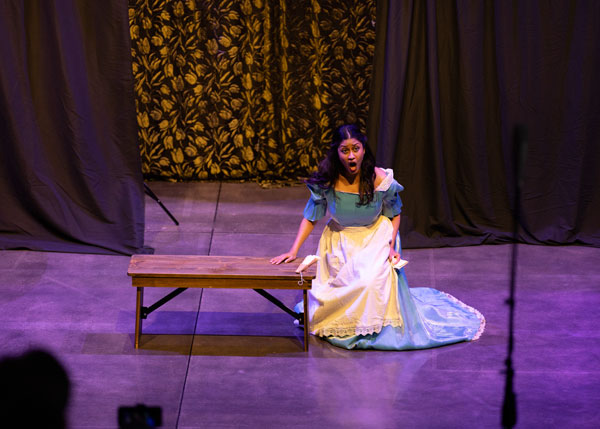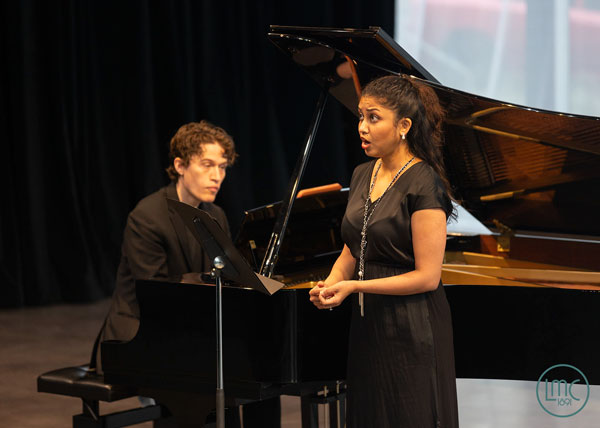Chance encounter with a Schubert specialist and a concert back home
View(s):- The Art of The Lied: The Lieder of Schubert concerts organised by the Chamber Music Society of Colombo are a homecoming of sorts for Dhanushi Wijeyakulasuriya
By Rahul Jacob
Dhanushi’s initial reaction to finding one could sign up online for lessons with a legend of opera and lieder was disbelief. “I was a little sceptical,” she recalls with peals of laughter. “I thought, ‘Is this a scam?’”

Performing in Seattle: Dhanushi as Barbarina in The Marriage of Figaro (above) and (right), in Everyone Sang at the Tagney Jones Hall. Pix by William Munoz
A few months after she started lessons with Bonney, she received a message from Johann Peiris, the pianist performing with her in these concerts. He had seen some of her Schubert lieder online and asked when she might do a selection in Colombo. “If you play for me, I will,” she replied.
The concerts organised by the Chamber Music Society of Colombo are a homecoming of sorts for Dhanushi, who has not performed in Colombo since 2018. In that time, she completed a PhD in statistics at Penn State University before moving to Seattle to work for Microsoft as a senior data scientist. Speaking in her personal capacity, Dhaushi explained that she works on the experimentation platform team at Microsoft, helping teams across Microsoft run online experiments to evaluate the impact of new feature changes on users. In her free time, she continues to perform lieder as well as sing for the church she is a member of.
Dhanushi mostly works from home, which makes this juggling act easier. In a recent week, she began her day with a voice lesson with Bonney, who lives in Salzburg, between 8.15 a.m. and 8.45 a.m. and then clocked in to work at 9 a.m.
She makes light of managing the seemingly right brain-left brain dichotomy of highly analytical work of data science on the one hand and the creativity needed for music on the other, arguing that many of her peers growing up in Sri Lanka were similarly gifted at math, engineering and music. “It came very naturally to me,” she says.
Similarly, Peiris, who works for the Collective for Historical Dialogue and Memory (CHDM) in Colombo, curated the acclaimed Rooted exhibition last year on the Malaiyaga Tamils and, in an individual capacity, did several interviews and archival research for the film that is part of the 88 Acres exhibition at the MMCA on Minnette de Silva’s thoroughly original ideas for a housing estate near Kandy.

Schubert lieder, reflecting the concerns of Germanic poetry, have lines aplenty about love of course, but also refer frequently to the forest. By odd coincidence, part of Dhanushi’s doctoral research involved modelling animal movements, including those of elk. This programme of Schubert lieder is extremely well chosen, a nice mix of lyrical singing and the darker tones of works such as Gretchen am Spinnrade, the lament of a spinner who has been seduced and abandoned and who kills her child, a story Goethe based on real-life instances of such tragedies at the time. A text, one of several that accompanied the music company Hyperion’s encyclopaedic recordings of practically every note Schubert wrote, observes, “The piano’s notes, trapped within a small space… seem like Gretchen’s confused thoughts hammering in her brain.”
Die Jonge Nonne, which Dhanushi says is currently her favourite of these lieder, features plenty of stormy weather, both climatic and the kind that roils the human mind. A young nun speaks of pledging herself to God. This is a Sufistic style of love but no less intense for its spirituality: “The loving bride awaits the bridegroom, purified in testing flames, betrothed to eternal love.” Singing it, reports Dhanushi, “creates this amazing sense of all these elements around me. I get lost in the piano accompaniment.”
Indeed, whereas in some lieder and many operatic compositions, the voice looms over everything else, in Schubert’s lieder, the conversation between the voice and the piano is a constant with the pianist usually continuing with a coda after the last vocal notes of the lieder. As Ian Bostridge, the well-known British tenor, wrote in the Guardian a few years ago, “The resources of the piano encouraged Schubert to produce songs of great harmonic complexity – from which a stunning simplicity can more tellingly emerge – in which the so-called accompanying instrument became more often than not the equal of the vocal soloist.”
Du bist die Ruh is more a conventional love song (“You are repose and gentle peace. You are longing and what stills it” among its lovelier lines), and perfect for a light lyric soprano such as Dhanushi. It was the first song she and Bonney worked on together.
In the final lieder of the evening, Der Hirt auf dem Felsen, the flute, piano and voice come together in a shepherd’s love song that yearns for spring when he will see his beloved again. Instead of the customary clarinet, Sureka Amerasinghe is playing the flute for this piece. Sureka taught Dhanushi as a young girl in school so the reunion is special for her. Dhanushi was also a voice student of Menaka Sahabandu for over 10 years. In addition, she had been in musicals with Peiris when they were in school in Colombo and was the soprano soloist in CMSC’s Vivaldi Gloria production before she moved to the US almost a decade ago.
The performances on June 29 and June 30 are thus underpinned by thanksgiving and reunion, themes Schubert would have applauded. An die Musik, one of the lieder at the beginning of the concert, is a hymn of gratitude to God for all that music gives us, “for a heaven of happier times.” Incredibly, Schubert wrote some 600 songs between his late teens and his death at 31. Only Mozart was so prodigious so young.
The Art of the Lied at the Goethe Institute on June 29 and June 30 promises to be an apt distillation of that outsized legacy.
Searching for an ideal partner? Find your soul mate on Hitad.lk, Sri Lanka's favourite marriage proposals page. With Hitad.lk matrimonial advertisements you have access to thousands of ads from potential suitors who are looking for someone just like you.


